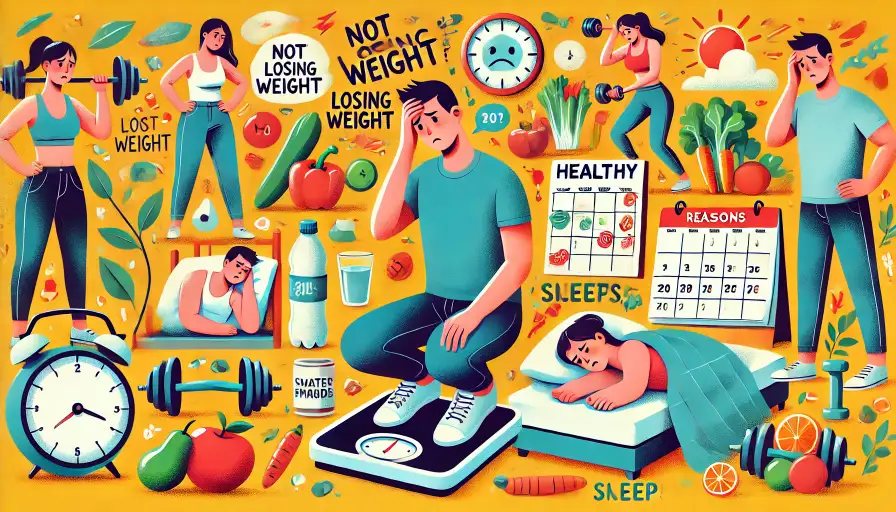15 Reasons You're Not Losing Weight and How to Overcome Them
Discover the common reasons behind weight loss plateaus and actionable tips to break through them for sustained progress.
Posted by
Related reading
Overcoming Weight Loss Plateaus: Understanding and Solutions
Learn what weight loss plateaus are, why they occur, and discover effective strategies to push past them and achieve your weight loss goals.
Managing Your Shopping Decisions: Tips for Healthy Eating on a Budget
Learn how to navigate your shopping habits responsibly and maintain healthy eating goals, even when faced with new snack options.
Finding Your Personal Motivation to Lose Weight
Discover how to identify your personal reasons for losing weight and stay motivated throughout your journey towards a healthier lifestyle.
Healthy Cooking at Home: 6 Strategies for Weight Loss
Discover the key benefits of home cooking and practical tips to make healthy meals that support weight loss goals without sacrificing flavor.
Transitioning to Weight Maintenance: Your Essential Guide
Learn how to successfully transition from weight loss to weight maintenance with practical tips and strategies tailored for your journey.

Understanding Weight Loss Plateaus
If you're diligently following a healthy diet and exercise routine but find that your weight isn't budging, you're not alone. Weight loss plateaus are common and can be frustrating. However, understanding the reasons behind them and adopting new strategies can help you overcome these obstacles.
1. Muscle Gain vs. Fat Loss
When you start exercising, especially with resistance training, you might gain muscle while losing fat. Since muscle is denser than fat, you could be losing inches without seeing a change on the scale. Focus on body composition and how your clothes fit rather than the number on the scale.
2. Inaccurate Scale Readings
Your scale might need recalibration if you've moved it or placed it on an uneven surface. Weigh yourself at the same time each day, ideally in the morning after using the bathroom, to get the most consistent results.
3. Adaptation to Exercise
Over time, your body becomes more efficient at performing exercises, burning fewer calories. To continue losing weight, increase the intensity, duration, or frequency of your workouts. Consider adding variety to your routine to challenge your body in new ways.
4. Eating Habits
Reevaluate your eating habits as your body may require fewer calories after losing some weight. Keep a food diary to ensure you're not consuming more calories than you realize. Avoid high-calorie, low-nutrient foods and focus on whole, nutrient-dense options.
5. Hydration
Drinking enough water is crucial for weight loss. Water helps you feel full and can replace high-calorie beverages. Aim for at least 2 to 6 cups of plain water daily.
6. Sleep
Poor sleep can affect the hormones that regulate hunger and appetite, leading to weight gain. Aim for 7-8 hours of quality sleep per night to support your weight loss efforts.
7. Stress Management
Stress can lead to emotional eating and cravings for high-calorie comfort foods. Practice stress management techniques like meditation, yoga, or deep breathing exercises to help keep your weight in check.
8. Frequency of Meals
Eating small, frequent meals might not necessarily boost metabolism. Instead, focus on eating balanced meals and healthy snacks. Intermittent fasting can also be an effective strategy for some people.
9. Alcohol Consumption
Alcohol is high in calories and can stimulate your appetite. Limit your intake to moderate levels and choose low-calorie options when you do drink.
10. Medical Conditions
Certain medical conditions like hypothyroidism and PCOS can hinder weight loss. Consult with your healthcare provider to manage these conditions effectively.
11. Medications
Some medications can cause weight gain or make losing weight more difficult. If you suspect your medication is affecting your weight, talk to your doctor about possible alternatives.
12. Menopause
Hormonal changes during menopause can lead to weight gain. Focus on maintaining a healthy diet, regular exercise, and getting enough sleep to manage weight during this transition.
13. Realistic Expectations
Weight loss is typically a slow process. Setting realistic goals and being patient with yourself can help you stay motivated. Remember, losing 1-2 pounds per week is a healthy and achievable target.
14. Non-Scale Victories
Track progress through non-scale victories like improved energy levels, better sleep, and increased strength. These are important indicators of your overall health and fitness.
15. Lack of Fiber in Your Diet
Fiber plays a crucial role in weight management by helping you feel full and satisfied, which can reduce overall calorie intake. High-fiber foods include fruits, vegetables, whole grains, and legumes. Increasing your fiber intake can help you maintain a healthy weight by promoting satiety and improving digestion.
Conclusion
Weight loss is a journey with ups and downs. By understanding the factors that contribute to plateaus and implementing new strategies, you can continue to make progress. Stay patient, stay motivated, and celebrate your non-scale victories.
Other Interesting Articles

Rediscovering the Joy of Cycling: A 6-Week Plan for Beginners
Unlock the benefits of cycling with our comprehensive guide and a practical 6-week plan designed for beginners to boost fitness and enjoy the ride.

How to Confidently Discuss Weight Management with Your Doctor
Helpful strategies for open conversations about weight management and effective healthcare advocacy.

The Impact of Snoring on Your Health and Weight Loss Goals
Discover how snoring and sleep quality affect your weight loss journey and learn how to improve your sleep for better health.

Understanding Low-Carbon Diets: Benefits for You and the Planet
Explore the concept of low-carbon diets, their environmental benefits, and how to implement plant-based eating into your lifestyle.